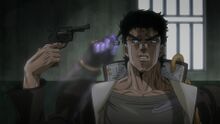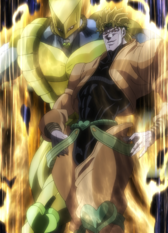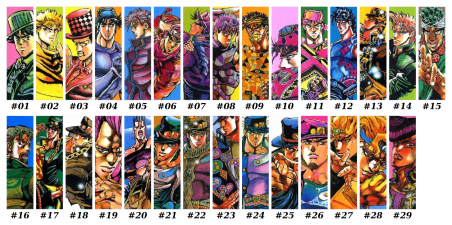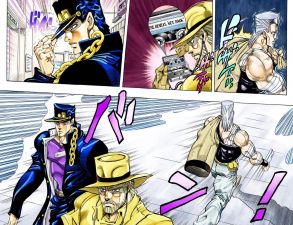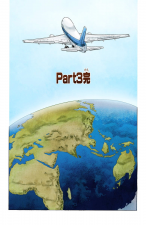Stardust Crusaders
- For the TV Anime adaption, see JoJo's Bizarre Adventure: Stardust Crusaders. For the OVA, see JoJo's Bizarre Adventure (OVA).
Stardust Crusaders (スターダストクルセイダース, Sutādasuto Kuruseidāsu) is the third part of JoJo's Bizarre Adventure, serialized in Weekly Shonen Jump between 1989 and 1992. Originally titled as JoJo's Bizarre Adventure Part 3 Jotaro Kujo: Heritage for the Future (ジョジョの奇妙な冒険 第三部 空条承太郎 ―未来への遺産―, JoJo no Kimyō na Bōken Dai San Bu Kūjō Jōtarō -Mirai e no Isan-), the arc is preceded by Battle Tendency and spans 152 chapters.
From 1988 to 1989,[1] the story follows Jotaro Kujo and his friends as they journey from Tokyo to Cairo to save his mother's life by defeating his family's resurrected archenemy, DIO.
Plot Summary
Jotaro Kujo
Part 3 follows Jotaro Kujo (空条 承太郎, Kūjō Jōtarō), the grandson of Joseph Joestar. Jotaro is a troublesome student given to getting into fights at school and antagonizing his teachers.
He is put in prison after beating up three armed men and a trained boxer, but he refuses to leave, claiming he's possessed by an evil spirit. To demonstrate, he takes a gun and shoots himself in the head, but the bullet is stopped by an arm shooting from his hand that only he and his mother Holy can see.
Joseph soon arrives with his friend Muhammad Avdol. A battle ensues between Avdol and Jotaro in which Avdol manifests his own evil spirit, using it to provoke Jotaro out of the cell.
Joseph reveals that Jotaro's "evil spirit" is actually a Stand, a manifestation of psychic power. Jotaro's Stand, named Star Platinum, possesses incredible precision and strength; Avdol's, known as Magician's Red, can control fire; Joseph's Stand, Hermit Purple, manifests as thorny vines that allow him to manipulate cameras and other mediums, capturing images from a great distance.
The Man with the Star
Joseph reveals that Jotaro's and his own Stand, having both manifested recently, appeared because of the reemergence of Dio Brando. When he sank to the bottom of the sea, DIO attached his severed head to Jonathan Joestar's body, using his new body's energy to remain alive. However, DIO's Joestar blood linked him to the rest of the family, and thus when DIO began to develop a Stand, Joseph and Jotaro did as well.
Noriaki Kakyoin
DIO vows to destroy the Joestar family and sends a student, Noriaki Kakyoin, to dispose of Jotaro. Kakyoin's Stand, Hierophant Green, possesses a nurse and attacks Jotaro with its Emerald Splash maneuver, but Jotaro defeats him soundly.
The Power Called a "Stand"; Head To Egypt; Tower of Gray
It is soon discovered, however, that Holy has developed a Stand. Her Stand appears as ivy growing from her body, but because she lacks the fighting spirit to control it, the strain of its activity begins to slowly kill her.
Joseph and Avdol determine that unless they kill DIO within fifty days and thus break his Stand's influence, Holy will die.
Jotaro analyses Joseph's photograph with Star Platinum's keen eyesight, helping the three determine that DIO is somewhere in Egypt. Kakyoin, freed by Jotaro from DIO's mind control, comes along to help the group.
On a jetliner, the group is ambushed by an insectoid Stand, Tower of Gray, forcing Kakyoin to prove his worth.
Silver Chariot
Jean Pierre Polnareff, user of the swordsman Stand Silver Chariot, challenges Avdol in Hong Kong but is eventually freed from DIO's control, joining the group to avenge his sister.
Dark Blue Moon
The heroes take a ship to Singapore but are forced to battle the aquatic Stand Dark Blue Moon, controlled by an assassin who has murdered and impersonated Captain Tennille, who sinks their ship.
Strength
Accompanied by a stowaway girl, the group boards an abandoned freighter but discover that the entire ship is a Stand called Strength, controlled by an orangutan.
The Devil
Devo the Cursed (Soul Sacrifice in the American version) uses his Stand, Ebony Devil, to accost Polnareff in Singapore.
Yellow Temperance
Rubber Soul and his Yellow Temperance impersonate Kakyoin before attempting to consume Jotaro.
Emperor and Hanged Man
In Calcutta they encounter the team of Hol Horse, user of a gun Stand called the Emperor, and J. Geil, the man with two right hands and the user of Hanged Man, a Stand of light that attacks from mirrors.
Polnareff avenges his sister by slaying her murderer, J. Geil, but Avdol is apparently killed by Hol Horse, who flees the scene.
Empress
Joseph is infected with a boil that turns out to be Empress, a Stand controlled by Nena, but outsmarts the cancerous foe.
Wheel of Fortune
En route to Pakistan the party battles Wheel of Fortune, a car Stand controlled by ZZ.
Justice
Enya Geil, mother of J. Geil, attempts to use her Stand Justice in an attempt to avenge her son, sending an army of animated dead after Polnareff and Jotaro.
Lovers
In Karachi, Steely Dan (Dan of Steel in the American version) uses Lovers to hold Joseph hostage, forcing Jotaro into the role of personal manservant.
Sun
Arabia Fats, user of Sun, attempts to thwart the group in the Arabian desert but is discovered and easily defeated.
Death Thirteen
The group is soon saddled with the baby Mannish Boy, who uses his Stand, Death Thirteen, to attack in dreams. Only through Kakyoin's quick thinking does the group survive Death Thirteen's dreamworld.
Judgement
On an island in the Red Sea, Polnareff is accosted by the genie Stand Judgement, but Avdol returns and saves the day.
High Priestess
Avdol appropriates a submarine, but the vehicle is infiltrated by High Priestess, a Stand controlled by Midler that can take the form of anything metallic; however, Star Platinum's power proves a simple but effective counter. The group then reach Egypt.
'The Fool' Iggy and 'God Geb' N'Doul
Upon arriving in Abu Simbel the heroes are joined by Iggy, a Boston Terrier and the user of The Fool, a simple but powerful Stand of sand.
They are immediately attacked by the blind Stand user N'Doul, who attacks with Geb, a Stand of water and the first of the nine Egyptian god Stands; he is able to slash through Kakyoin's eyes before he is defeated by Jotaro and Iggy.
'God Khnum' Oingo and 'God Tohth' Boingo
Oingo and Boingo (Zenyatta and Mondatta in the American version, respectively), users of the face-altering Stand Khnum and the future-predicting comic book Tohth respectively, attempt to defeat the heroes, but Oingo is incapacitated without the heroes even knowing he was there.
'God Anubis'
Anubis, a sword inhabited by a Stand, possesses a farmer named Chaka, a barber named Khan, and then Polnareff, nearly killing Jotaro.
'Goddess Bastet' Mariah
Mariah, the sultry user of Bastet, magnetizes Joseph and Avdol and leads them on a wild goose chase.
'God Sethan' Alessi
Polnareff and Silver Chariot are reduced to children by Sethan, the Stand of the child-abuser Alessi.
Shooting DIO?!
Hol Horse reports to DIO. When Hol Horse attempts to shoot him, DIO reveals a sense of the nature of his Stand.
D'Arby the Gambler
Later, the group encounters Daniel J. D'Arby, who offers information if they gamble with him, but when Polnareff and Joseph lose, D'Arby's Stand, Osiris, transforms their souls into poker chips. Only by laying everything on the line can Jotaro hope to defeat the gambler.
Hol Horse and Boingo
In Cairo the group meets Hol Horse again, who has partnered himself with Boingo, resulting in one memorable chapter revolving on the concept of a "prophecy going awry without contradicting itself".
The Gatekeeper of Hell, Pet Shop
Later, Iggy battles Pet Shop, DIO's pet falcon and the user of the ice-slinging Stand Horus. Kakyoin returns soon afterward, his eyesight mostly recovered.
D'Arby the Player
The doorway to DIO's mansion is guarded by Telence T. D'Arby, younger brother of D'Arby the Gambler. His Stand, Atum, steals Kakyoin's soul after a round of video games, but despite D'Arby's mind games Jotaro is able to outwit him.
Meanwhile, Polnareff, Iggy, and Avdol easily dispose of Kenny G., whose Tenore Sax Stand creates an illusory maze.
The Mist of Emptiness, Vanilla Ice
Avdol is then killed by an invisible force that is revealed as DIO's henchman, Vanilla Ice, whose Stand, Cream, swallows itself into another dimension and instantly obliterates anything its sphere of destruction touches.
Ice, who killed himself for DIO but was revived by DIO's blood, kills Avdol and is able to nearly eliminate Polnareff, but a valiant maneuver by Iggy allows Polnareff to ultimately win. Unfortunately, this results in Iggy's death.
Suzi Q Joestar Visits Her Daughter
Suzi Q arrives in Tokyo from New York City to visit Holy and wish for her husband and grandson's success.
DIO's World
Meanwhile, Jotaro, Joseph, and Kakyoin encounter Nukesaku, but easily defeat him.
Though wounded and alone, Polnareff confronts DIO but is confounded by the vampire's powers. When the four surviving heroes are reunited they climb to DIO's tower with Nukesaku in tow, but when he opens the casket he inexplicably ends up mutilated inside it.
DIO chases Joseph and Kakyoin across Cairo until Kakyoin, at the price of his life, discovers that DIO's Stand, The World, is able to stop time.
With most of his friends dead or injured, Jotaro confronts DIO. Though The World has a huge advantage in the ability to stop time, Jotaro nearly defeats DIO, but the vampire restores himself by draining Joseph's blood, becoming even stronger.
Finally DIO attempts to finish off Jotaro by crushing him with a steamroller, after which Jotaro reveals the ability to also stop time.
The Faraway Journey, Farewell Friends
After DIO is defeated, Jotaro oversees a blood transfusion from his remains and the newly deceased Joseph. As a result, Joseph is resurrected. Afterwards, Jotaro and Joseph lay DIO's body out in the desert at dawn, where the Egyptian sun disintegrates the vampire's body completely.
Some time later, Jotaro, Joseph and Polnareff say their goodbyes to one another and promise to fly over and lend assistance to each other should they call for it before going their separate ways, while Holy finally awakens back in Japan and eagerly awaits her son and her father's return.
Characters
Major Battles
Chapters
Stardust Crusaders consists of 152 chapters, compiled into Volume 12 to 28 of the Jump Comics collected editions. The left column consists of the titles from the bunkoban edition released in 2003. The right column uses the titles from the original serialization in Weekly Shonen Jump. Volume 12 and 13 use the Weekly Shonen Jump titles while Volume 14 to 28 use the bunkoban titles.[3][2]
| Volume 12: The Birth of the Ultimate Being!! | Release Date: | ISBN: | |||||
|---|---|---|---|---|---|---|---|
| (超生物の誕生!!, Chō Seibutsu no Tanjō!!) |
|||||||
| Bunkoban Titles (Vol. 12 & 13) Tankōbon Titles |
Weekly Shonen Jump Titles | ||||||
|---|---|---|---|---|---|---|---|
|
|
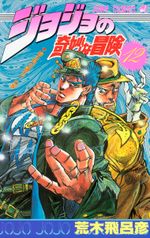
| |||||
| Volume 13: DIO's Curse |
Release Date: | ISBN: | |||||
|---|---|---|---|---|---|---|---|
| (DIO の呪縛, DIO no Jubaku) Volume 1: The Evil Spirit |
|||||||
| Bunkoban Titles (Vol. 12 & 13) Tankōbon Titles |
Weekly Shonen Jump Titles | ||||||
|---|---|---|---|---|---|---|---|
|
|
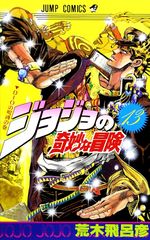
| |||||
| Volume 14: The Empty Ship and the Ape |
Release Date: | ISBN: | |||||
|---|---|---|---|---|---|---|---|
| (無人船と猿, Mujinsen to Saru) Volume 2: Silver Chariot |
|||||||
| Bunkoban Titles (Vol. 12 & 13) Tankōbon Titles |
Weekly Shonen Jump Titles | ||||||
|---|---|---|---|---|---|---|---|
|
|
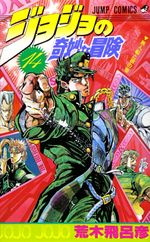
| |||||
| Volume 15: The Gun Is Mightier than the Sword |
Release Date: | ISBN: | |||||
|---|---|---|---|---|---|---|---|
| (銃は剣よりも強し, Jū wa Ken yori mo Tsuyoshi) Volume 3: The Emperor and the Hanged Man |
|||||||
| Bunkoban Titles (Vol. 12 & 13) Tankōbon Titles |
Weekly Shonen Jump Titles | ||||||
|---|---|---|---|---|---|---|---|
|
|
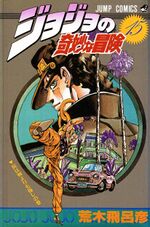
| |||||
| Volume 16: Battle Apprentice! |
Release Date: | ISBN: | |||||
|---|---|---|---|---|---|---|---|
| (戦いの年季!, Tatakai no Nenki!) Volume 4: Terror in India |
|||||||
| Bunkoban Titles (Vol. 12 & 13) Tankōbon Titles |
Weekly Shonen Jump Titles | ||||||
|---|---|---|---|---|---|---|---|
|
|
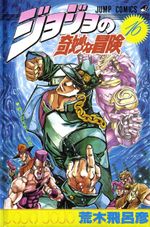
| |||||
| Volume 17: The Terrifying Lovers |
Release Date: | ISBN: | |||||
|---|---|---|---|---|---|---|---|
| (恐ろしき恋人, Osoroshiki Rabāzu) Volume 5: City of Death |
|||||||
| Bunkoban Titles (Vol. 12 & 13) Tankōbon Titles |
Weekly Shonen Jump Titles | ||||||
|---|---|---|---|---|---|---|---|
|
|
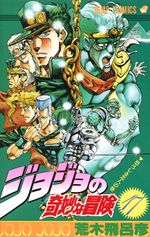
| |||||
| Volume 18: A Dream of Death Thirteen |
Release Date: | ISBN: | |||||
|---|---|---|---|---|---|---|---|
| (夢の Volume 6: The Arabian Nightmare |
|||||||
| Bunkoban Titles (Vol. 12 & 13) Tankōbon Titles |
Weekly Shonen Jump Titles | ||||||
|---|---|---|---|---|---|---|---|
|
|
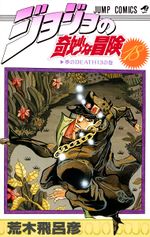
| |||||
| Volume 19: The Magic Lamp |
Release Date: | ISBN: | |||||
|---|---|---|---|---|---|---|---|
| (魔法のランプ, Mahō no Ranpu) Volume 7: The Three Wishes |
|||||||
| Bunkoban Titles (Vol. 12 & 13) Tankōbon Titles |
Weekly Shonen Jump Titles | ||||||
|---|---|---|---|---|---|---|---|
|
|
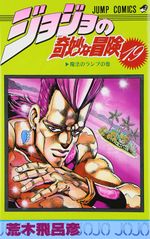
| |||||
| Volume 20: The Exploding Orange |
Release Date: | ISBN: | |||||
|---|---|---|---|---|---|---|---|
| (爆弾仕かけのオレンジ, Bakudan Shikake no Orenji) Volume 8: Iggy the Fool and the Great God Geb |
|||||||
| Bunkoban Titles (Vol. 12 & 13) Tankōbon Titles |
Weekly Shonen Jump Titles | ||||||
|---|---|---|---|---|---|---|---|
|
|
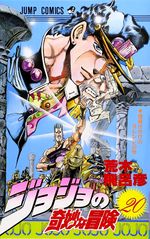
| |||||
| Volume 21: The Woman's Legs Are Her Weapons |
Release Date: | ISBN: | |||||
|---|---|---|---|---|---|---|---|
| (脚がグンバツの女, Ashi ga Gunbatsu no Onna) Volume 9: The Deadly Sword |
|||||||
| Bunkoban Titles (Vol. 12 & 13) Tankōbon Titles |
Weekly Shonen Jump Titles | ||||||
|---|---|---|---|---|---|---|---|
|
|
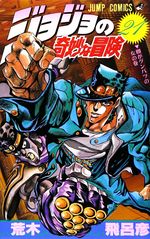
| |||||
| Volume 22: Disappearance in a Locked Room |
Release Date: | ISBN: | |||||
|---|---|---|---|---|---|---|---|
| (密室で消失, Misshitsu de Shōshitsu) Volume 10: The Shadow of Set |
|||||||
| Bunkoban Titles (Vol. 12 & 13) Tankōbon Titles |
Weekly Shonen Jump Titles | ||||||
|---|---|---|---|---|---|---|---|
|
|
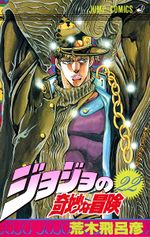
| |||||
| Volume 23: D'Arby's Collection |
Release Date: | ISBN: | |||||
|---|---|---|---|---|---|---|---|
| (ダービーズコレクション, Dābīzu Korekushon) Volume 11: D'Arby the Gambler |
|||||||
| Bunkoban Titles (Vol. 12 & 13) Tankōbon Titles |
Weekly Shonen Jump Titles | ||||||
|---|---|---|---|---|---|---|---|
|
|
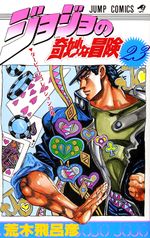
| |||||
| Volume 24: The Gatekeeper of Hell, Pet Shop |
Release Date: | ISBN: | |||||
|---|---|---|---|---|---|---|---|
| (地獄の門番ペット・ショップ, Jigoku no Monban Petto Shoppu) Volume 12: The Claws of Horus |
|||||||
| Bunkoban Titles (Vol. 12 & 13) Tankōbon Titles |
Weekly Shonen Jump Titles | ||||||
|---|---|---|---|---|---|---|---|
|
|
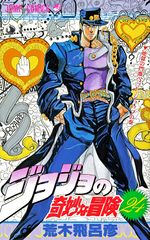
| |||||
| Volume 25: D'Arby the Player |
Release Date: | ISBN: | |||||
|---|---|---|---|---|---|---|---|
| (ダービー・ザ・プレイヤー, Dābī za Pureiyā) Volume 13: D'Arby the Player |
|||||||
| Bunkoban Titles (Vol. 12 & 13) Tankōbon Titles |
Weekly Shonen Jump Titles | ||||||
|---|---|---|---|---|---|---|---|
|
|
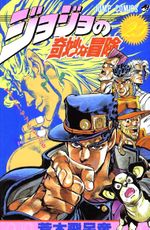
| |||||
| Volume 26: The Mist of Emptiness, Vanilla Ice |
Release Date: | ISBN: | |||||
|---|---|---|---|---|---|---|---|
| (亜空の瘴気 ヴァニラ・アイス, Akū no Shōki Vanira Aisu) Volume 14: Showdown |
|||||||
| Bunkoban Titles (Vol. 12 & 13) Tankōbon Titles |
Weekly Shonen Jump Titles | ||||||
|---|---|---|---|---|---|---|---|
|
|
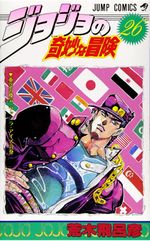
| |||||
| Volume 27: DIO's World |
Release Date: | ISBN: | |||||
|---|---|---|---|---|---|---|---|
| (DIOの世界, DIO no Sekai) Volume 15: Dio's World |
|||||||
| Bunkoban Titles (Vol. 12 & 13) Tankōbon Titles |
Weekly Shonen Jump Titles | ||||||
|---|---|---|---|---|---|---|---|
|
|
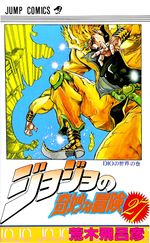
| |||||
| Volume 28: The Faraway Journey, Farewell Friends |
Release Date: | ISBN: | |||||
|---|---|---|---|---|---|---|---|
| (遥かなる旅路 さらば友よ, Haruka naru Tabiji Saraba Tomo yo) Volume 16: Journey's End |
|||||||
| Bunkoban Titles (Vol. 12 & 13) Tankōbon Titles |
Weekly Shonen Jump Titles | ||||||
|---|---|---|---|---|---|---|---|
|
|
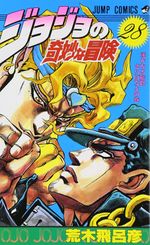
| |||||
Publication
Volumes are published in English by VIZ Media, and in Italian by Star Comics (Italy).
English Language Edition
Stardust Crusaders was the first part to be officially released in English. The series is edited by Jason Thompson, author of Manga: The Complete Guide.
Some names were altered for the English release, presumably for copyright reasons. Additionally, the character Devo was changed entirely.[citation needed]
Minor edits were made to artwork where certain scenes of animal violence were redrawn by Hirohiko Araki for the English release. Japanese volume 15 (English volume 3) featured a single panel of a dog being decapitated which was redrawn from an alternate angle, and Japanese volume 18 (English volume 6) has several redrawn panels where a mutilated dog was changed into a large rat.
Due to a controversy regarding one scene involving DIO apparently reading the Qur'an in the OVA, Viz Media and Shueisha paused publication for a year, even though the manga did not feature that specific scene. However, Shueisha had Araki (or his assistants) redraw scenes that depicted characters fighting on top of or destroying buildings resembling mosques. Viz resumed publication on April 7, 2009 with Volume 11.
Adaptations
Animation
- The official TV anime began airing in Japan on April 4, 2014.
- JoJo's Bizarre Adventure (OVA), produced by Studio APPP; 1993 and 2001
Video Games
- JoJo's Bizarre Adventure (Super Famicom), 1993
- JoJo's Bizarre Adventure: Heritage for the Future; Capcom, 1998
- The cast of Stardust Crusaders has the highest representation in All Star Battle(PS3).
Other
Gallery
Trivia
- This story was initially titled "Dai San Bu Kūjō Jōtarō: Mirai e no Isan" / "第三部 空条承太郎 ―未来への遺産" / (lit.) "Part 3 Kūjō Jōtarō: Heritage for the Future".
- Stardust Crusaders contains the most popularly known characters and episodes of the series; introducing JoJo's distinctive Stand phenomenon, and the emblematic protagonist Jotaro Kujo.
- Many characters were not named until the release of additional materials like the artbooks.
- Araki describes the basis for Part 3 as like a board game, travelling between a series of stops; and further inspiration from the film Around the World in 80 Days.[36]
- While he began plotting for this part, Araki first pitched it as a modern retelling of Dracula. There was only one person in the room who thought it was a good idea; the rest were utterly confused. His editors told him to have at least one Japanese character/story arc prior to this part, as they felt the story had too many foreign characters and settings for the comic's target audience.[37]
- Clamp in Wonderland represents a popular, classic tribute/doujinshi to Part 3.
- Part 3 is the last part to feature any vampires or the Ripple ability.
